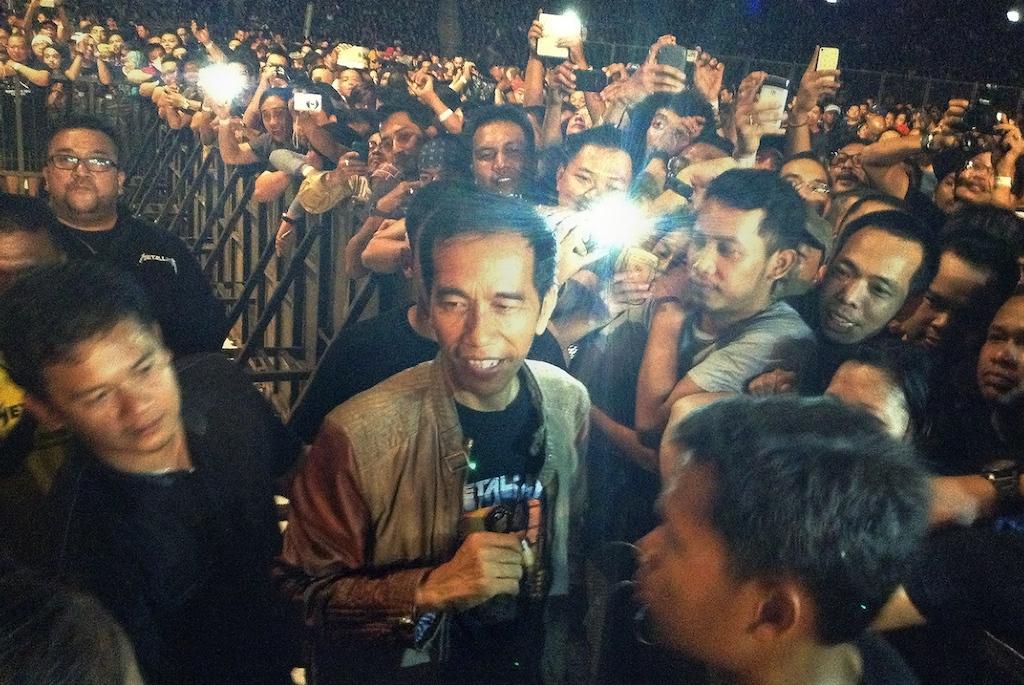Indonesia’s next president will be either a hot-tempered ‘manly man’ or a ‘puppet’ populist
Joko Widodo is swarmed by fans as he arrives at a Metallica concert in August, 2013. He wants to be Indonesia’s next president, and he may win.
JAKARTA, Indonesia — For 10 years Indonesia has had the same president — by far the longest tenure for a democratically elected leader in the sprawling island nation, the world’s fourth biggest by population. On July 9, voters will elect his replacement — a key next step toward stable democracy in this Muslim majority nation.
In these final weeks, the race between rivals Joko Widodo, Jakarta’s governor, and Prabowo Subianto, a former general, is getting tighter, hotter, and more personal.
Here’s what supporters and opponents are saying about the two contenders to lead the world’s third largest democracy.
Prabowo Subianto
What his supporters say: He’s the man, the manly man
“Almost every manly man votes for Prabowo. If a man doesn’t vote for Prabowo, his masculinity must be questioned.” That’s how Indonesian rock star Ahmad Dhani explained why he supports the former general. The truth is that Prabowo’s status as a “strongman” is what seduces his supporters.
Prabowo is a former general, and has definitely kept up some habits from his time in the army. His political meetings look like military celebrations. He loves loud nationalist speeches shouted into vintage microphones. He greets his supporters with military salutes. At his first big political rally this year, he made a spectacular arrival by helicopter and jeep before showing his equestrian skills to the crowd on a pure-bred stallion, a traditional dagger at his waist.
Watch out, Vladimir Putin.
He presents himself as a firm, decisive leader, and his supporters love it. Indonesia, with its 250 million people, hundreds of ethnic groups and languages, and endemic corruption, can only be led by a man with a military background and iron fist, they argue.
How his opponents see it: He’s an angry war criminal (and a psychopath)
Prabowo, a former special forces chief, has been accused of serious abuses in East Timor and Indonesia, and has consequently been banned from entering the US. Like much of Indonesia’s political elite, he has strong ties with the 30-year “New Order” regime of dictator Suharto. In fact, he married the deceased autocrat’s daughter. When Suharto fell in 1998, Prabowo was dismissed from the army for organizing the kidnapping of anti-regime activists.
He is also known to have a hot temper.
Last month, he allegedly punched a bypasser in the face. More recently, the former head of Indonesia’s intelligence service (and a Jokowi supporter) alleged that an army mental examination showed Prabowo was a “psychopath.”
To Prabowo’s followers, all these allegations are false, part of “black campaigns” to tarnish his reputation. But for many analysts, Prabowo could be a danger to democracy. As Indonesia expert Edward Aspinall puts it, “There is much in his personal history, his rhetoric, and his political style to suggest that a Prabowo presidency would pose a significant threat of authoritarian reversal.”
Joko Widodo
What his supporters say: He’s a man of the people
Jokowi is pretty much the exact opposite of Prabowo in terms of political style. Forget the thoroughbred; Jokowi went to register his candidacy on a bicycle, along with his 72-year-old running mate.
He gained a reputation as an incorruptible “problem solver” while mayor of his hometown Solo, where he was re-elected with 90 percent of the votes. He dresses simply, talks like a normal person, and has made a habit of “getting out of the office” to meet the people and check that his employees at the city council are actually working. In a country known for rampant corruption, amazingly slow bureaucracy, and an entrenched political elite, Jokowi has won a lot of support. He’s seen as the “first genuinely post-Suharto figure,” political analyst Paul Rowland says.
How his opponents see it: He’s just a puppet (and he can’t even speak English
Jokowi was completely unknown three years ago, has zero national experience, and is clearly not a fan of official speeches. To his opponents, he doesn’t have what it takes to be the leader of a mega-country.
Jokowi, they also say, is merely a puppet candidate in the hands of his party’s chairwoman and daughter of the country’s founding father, Megawati Sukarnoputri. Analysts have also doubted his capacity to make decisions independently from his party. “Is Jakarta’s popular governor just an empty suit?” the Jakarta Globe asked shortly after his nomination.
Jokowi, like Prabowo, has been the target of many negative campaigns in the past weeks. A possible nadir: when a television station owned by one of Prabowo’s biggest (and richest) supporters aired a 4-minute-long story whose sole purpose was to compare the two candidates’ level of English.
Spoiler alert: Prabowo won.
